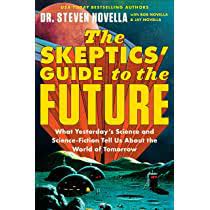You have /5 articles left.
Sign up for a free account or log in.
 The Skeptics’ Guide to the Future: What Yesterday’s Science and Science Fiction Tell Us About the World of Tomorrow by Steven, Bob and Jay Novella
The Skeptics’ Guide to the Future: What Yesterday’s Science and Science Fiction Tell Us About the World of Tomorrow by Steven, Bob and Jay Novella
Published in September 2022
This post aims to persuade my friend Bryan Alexander (and maybe you) to read The Skeptics’ Guide to the Future.
On March 28, 2023, Bryan’s new book, Universities on Fire: Higher Education in the Climate Crisis (JHU Press), will come out. Bryan’s new book, I predict, will catalyze a postsecondary ecosystem–wide conversation about how colleges and universities are both preparing for and addressing climate change. This will be a conversation about the future of higher education through the lenses of extreme weather, energy transitions and institutional resilience.
I want Bryan to read The Skeptics’ Guide to the Future in the run-up to the publication of his Universities on Fire because I’m hoping to start that future of higher ed conversation. Ideally, our community will be ready to hit the ground running to read, discuss and grapple with Universities on Fire starting on March 28, perhaps through campus book clubs, symposia, invited speakers, ad hoc committees and teach-ins.
Where I found The Skeptics’ Guide to the Future helpful—and where I’m hoping Bryan will weigh in—is in getting my head around how futurists work. The book quotes Nobel laureate Dennis Gabor saying, “The future cannot be predicted, but futures can be invented.” The work of futurism and higher ed futurism is about helping to imagine the futures we wish to create.
A theme that runs through The Skeptics’ Guide is just how badly past predictions have fared. Arguably, yesterday’s futurists largely missed the two most important technologies that drive so much of modern economic and social life—the internet and the smartphone.
Prior predictions for life in the 21st century were full of flying cars and defined gender roles. Past predictions of the future tended to miss that not only will technologies change but that future people will also be different.
As The Skeptics’ Guide to the Future enumerates over and again across examples as diverse as employment, transportation and communications, future visions of society tend to overestimate short-term change while vastly underestimating change in the long term.
One aspect I liked about The Skeptics’ Guide to the Future is how deep the Novella brothers dive into the science. This is not a book that shies away from deep technical and scientific explanations. The Novellas are serious folks, and their approach to projecting future developments is always grounded in established scientific theories and facts.
True believers of transformative technologies (say, fusion) or Mars colonization will likely be disappointed in the book’s conclusions. (Spoiler: space travel will likely be slow and uncomfortable for a long time and humans are probably stuck on Earth as our only population-level habitat.)
As we get into the head space to talk about Universities on Fire in 2023, building some higher ed futurist muscles by reading good books such as The Skeptics’ Guide to the Future is probably a good idea.
The Skeptics’ Guide to the Future started as the Skeptics’ Guide to the Universe podcast. I don’t usually listen to podcasts, as they take away audio time from books. But this a podcast that I might check out. Don’t worry. The transition from podcast to book here is seamless.
What are you reading?




